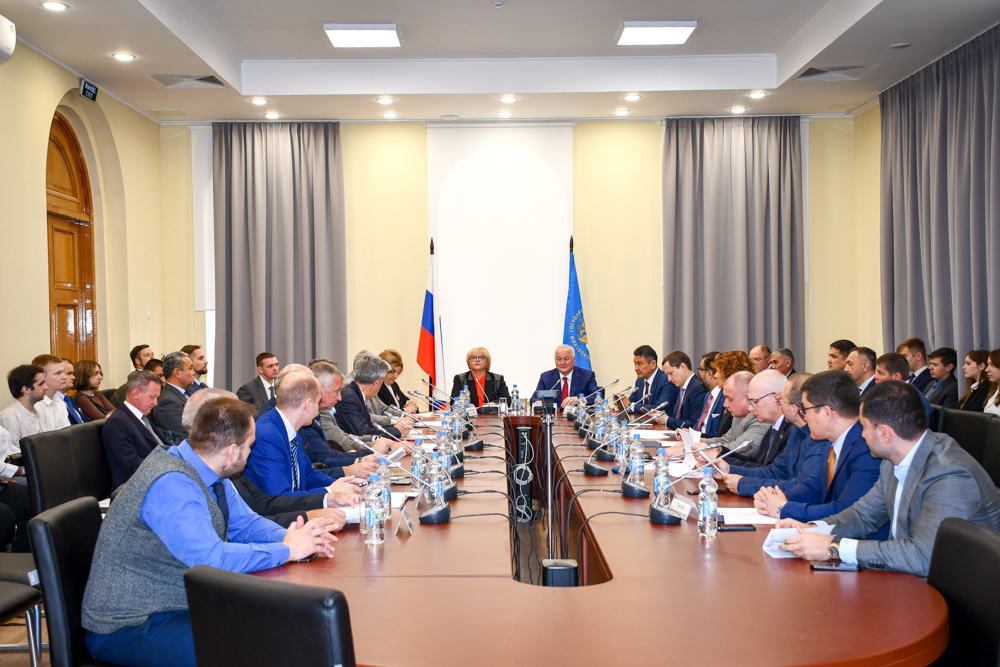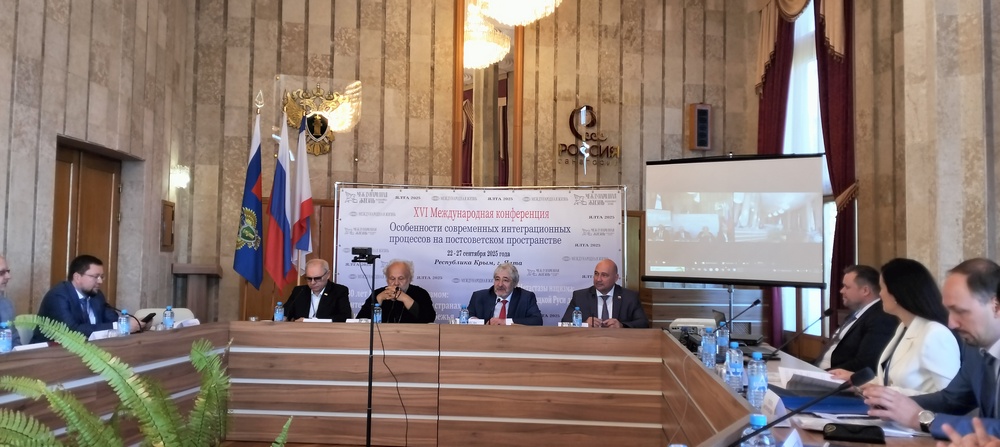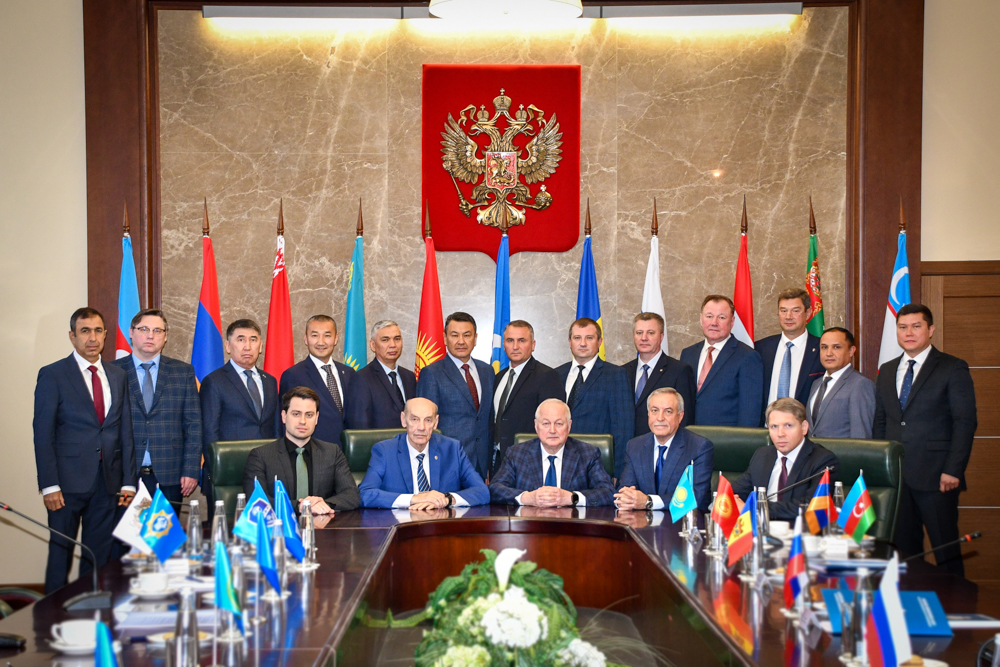November 7, 2016
Dear colleagues!
Today we open an International Information-Tutorial Round Table and a subsequent training on "Countering Terrorism and Extremism during Information-Psychological Wars: Analysis, Research, Forecast" for the heads of analytical units of the security agencies, special services, law enforcement engaged into fight on terrorism and extremism.
The round table has been organized by the CIS Anti-Terrorism Center and International News Agency "Russia Today" with support from the Russian companies MG Apocryphe and Group-IB.
There was a good reason to choose a topic and format of the today's event. For the last five years the CIS ATC together with the partner security bodies, special services and law enforcement of the Commonwealth states have organized a number of events aimed at elaboration of most efficient forms of cooperation in organization of counteraction to terrorism and other manifestations of violent extremism with use of modern information technologies.
For example, the CIS ATC in partnership with the Government and State Committee of National Security of the Kyrgyz Republic held a large international conference on the issues of cooperation aimed at countering terrorist and extremist organizations in the context of development of modern communication technologies.
The conference brought together participants from 16 states, special services, security bodies, law enforcement and financial intelligence units of the CIS states, UN Counter-Terrorism Committee Executive Directorate, Executive Committee of the Regional Anti-Terrorism Structure of the Shanghai Cooperation Organization, Action against Terrorism Unit of the Transnational Threat Department of OSCE, Coordination Service of the CIS Council of the Commanders of the Border Forces, as well as a number of international research centers and public organizations.
It was generally agreed that the most dangerous terrorist threats in the contemporary world are linked with terrorist use of information-telecommunication technologies combined with traditional methods of terrorist activity, recruitment of new members and their training for sabotage operations, merger of international terrorist organizations and organized crime, significant expansion of international and domestic financing. Return of terrorist-fighters, who have fought alongside international terrorist organizations abroad, to the countries of origin pose a hight risk to public security.
CIS ATC pays great attention to propagation of terrorist and extremist content through Internet and its use in so called information warfare.
This problem was not born yesterday. The fight on terrorism and extremism is concluded not just in timely identification and suppression of terrorist and extremist acts. Countering the crimes which form a so called infrastructure for terrorism and extremism is among the important lines of our work. It includes involvement into terrorist and extremist organizations and their financing, other material support as well as propaganda of terrorist and extremist values.
Experts note a phenomenon of self-recruitment when ideological views of the global network users get suddenly radicalised under the influence of the distributed propaganda and as a result they actively seek for contacts with members of extremist and terrorist structures.
The efficiency of operational counteraction significantly drops since up to 90 % of extremist electronic resources are physically located outside the CIS territory. If we call it like it is, there is an ongoing open information warfare against Russia and our partner-states, and radicalization of our citizens is mainly a direct result of the outside influence. And it is not always that the ISIS's media-resource is a subject of this subversive activity, though its influence is mostly felt today.
Let me give you an example. In September this year the Osh city court of Kyrgyz Republic passed a sentence upon four members of ISIS who were arrested by the state security agency. The arrested were born in 1994 and 1995. That terrorist group was formed through social media. The arrested were ideologically recruited during their labor migration. Then the recruiters sent them to Osh for carrying out so called jihad by killing five citizens of the Osh region claimed to be infidel and commit a number of armed assaults in Osh to finance operations of international terrorist groups in Syria.
This is to demonstrate that social media are used to recuite citizens of the Central Asian states being in labor migration in other countries, including Russia. We together with our partner security bodies, special services and law enforcement of the Commonwealth states make sustained joint efforts to prevent such recruitments and to search those who have committed terrorist and extremist crimes but flee from justice in the territory of other states of the Commonwealth.
Today we can talk with confidence about extremism and terrorism (first of all, political terrorism run under the guise of religion beliefs) and destructive influence on brains as related facts which form a self-consistent social phenomenon. Actually we note an increase in capacity of the destructive activity, it becomes quite an efficient tool to destabilize entire states and event regions. For example, Khizb ut-Takhrir is an illegal religious-political organization which ideology and targets are based on substitution of the existing constitutional order, replacement of secular authorities with religious-social project based on political Islam. Khizb ut-Takhrir does not recognize not only official secular authorities but official clergy as well. Recruiters of Khizb ut-Takhrir exhibit activity at the worship places, centers of religious ad secular education and places of compact living of labor migrants who are mainly citizens of of the Central Asian states of the Commonwealth.
The term "information warfare" is rooted in propaganda and currently bears a negative historical connotation and is used more rarely. The methods of classical propaganda are constantly added with new techniques of psychological pressure and manipulations. Special mind games are widely used by extremist and terrorist organizations at all stages to recruit new members. Those convincing mechanisms help "salaried" psychologists of the extremist and terrorist organizations to recruit and train subjects in a very short time for committing specific terrorist acts or continued operations, including undercover ones.
I don't think that in this audience there is a need to specially focus on a transborder nature of malicious communication interventions. This is quite obvious. It is also obvious that operations of international and extremist organizations are woven into contemporary information wars which in their turn represent an integral component of so call hybrid wars. Their general goal-setting is to destabilize the states and entire regions, undermine national sovereignty, replace constitutional order.
Strictly speaking, the problem has already drifted towards political security.
Hence, configuration and content of information countermeasures in the CT and CVE field radically change. Here a joint responsibility of state and business lies in generation of technologies, algorithms of timely identification, arresting, neutralization of such challenges and their practical implementation.
In this context I deem it reasonable to highlight some directions of international anti-terrorism cooperation which have already proved their efficiency for the CIS states.
The program documents of the CIS states related to counter-terrorism and counter-extremism focus security bodies, special services and law enforcement to counteract criminal encroachments in the field of information security. Protection of information-communication space is considered by each and every CIS member-state as an integral component of the national security and information sovereignty. Today this task is among the key directions of join activity of the security agencies, special services and law enforcement of our countries.
In November 2013 the CIS Inter-Parliamentary Assembly adopted Recommendations on legal governing of operation of open telecommunication networks to prevent their use for terrorist and other illegal purposes. The package also included another core document - Recommendations on improvement and harmonization of national legislation of the Commonwealth states in the sphere of information security. One of the goals set was to create means of protection against information which may inflict harm to socio-psychic health of citizens, including possible impact on the quality of content in the Internet environment.
Expansion and deepening of cooperation between the CIS states in the area of information security is accompanied by expansion of respective glossary. In order to form a common or at least a homogeneous conceptual structure, our Belarus partners have developed a glossary which allows to structure and define key nodes of contemporary information field and its processes.
Or partners have rightly pointed at the necessity to avoid narrow, so called technocratic approach when the problem of information security is artificially narrowed to information protection. Life proves an importance of such approach.
Information security has predictably become associated with practice of so called "mental wars" which are launched in the media space today. It is obvious and doubtless that Russia and other states of the Commonwealth are objects of mental information operations.
Let me remind you that the Doctrine for Joint Psychological Operations has been implemented in the USA since 2003. However the concept of information wars traces its root in earlier historical periods.
The Russian media have found themselves not just on the front-line of the information war but on the frontier, i.e. in the area where there are no laws and sheriffs. Direct opposition to the "Russia Today" media channel simply underlines zero tolerance of the information confrontation.
We perfectly well realize the significance of media policy of the Commonwealth states.
Information component of operations of military agencies, including information support of the Russian MoD's military operation in Syria, is equally important. At the same time, security bodies, special services and law enforcement of the CIS states are steered at information counteraction within their traditional paradigm which is national security, counter-terrorism and counter-extremism.
The analysis findings of quality parameters of contemporary infromational wars allowed us to identify a number of problems which need to be further surveyed. Most of them are linked with import phaseout of software and specific techniques to be employed in carrying out both system and specific information countermeasures in the Internet within the counter-terrorism and counter-extremism context.
An independent mission is to find common methodological aspects in variable information operations and campaigns subject to direct employment in practice. Besides, we see clearly the necessity of advanced information countermeasures training of the persons who are engaged into managerial decisions both at the state and regional (agency, corporate) level.
The above observations forced us to formulate the objectives of this International Information-Tutorial Round Table as follows:
- Discovering and discussing applicable research and engineering undertakings, developments and practices in identification, monitoring, analysis and conduct of measures in the field of information-psychological counteraction in the Internet.
- Discovering crucial tasks demanded in this field but having no applicable solutions yet.
- Building teams working on different directions related to development of methods and technologies of information-psychological counteraction in the Internet.
- Consolidating and classifying developments of software and specific techniques which could be utilized to be employed in carrying out both system and specific information countermeasures in the Internet within the counter-terrorism and counter-extremism context.
Within the frameworks of our event we also plan to conduct training on most topical issues:
— structural and behavioural analysis of social media in identification terrorist threats;
— big data of social media as a base for identification of social media of propaganda distribution and event forecasting;
— technology of analysis of obtained from Invisible Internet data basis on persons and organizations;
— methodology of campaigns to initiate and defensive responses to information attacks;
— detection of astroturfing with use of group behaviour and content originality analysis;
— use of gamer community in information wars, etc.
The events like this usually suggest inviting scientists specialised in studying variable aspects of information wars and information security in general.
However, this time we have agreed with the partners to make a different, non-traditional decision. Considering specificity of the set objectives, we have invited practicians who have developed original software or original proprietary technology which are related to information security technologies and to be employed in counter-terrorism and counter-extremism.
More over, while choosing the experts we were guided by the fact that proposed software and techniques have already been tested and practically applied. I hope the technologies to be presented at our round table will be on demand.
Dear colleagues!
Experience of cooperation of the security bodies, special services and law enforcement of the CIS states in preventing terrorist acts associated with use information-communication technologies allows for the following important conclusions:
First. Today there is a need in not just a defence in depth, but an offensive strategy to be implemented at the strategic and operational level. National and inter-state concepts of information security which have already been created and implemented in the CIS are the basic elements of such strategy.
Second. With the development of contemporary communication technologies, regional and national initiatives and special programs aimed at cooperation in countering terrorist and extremist organizations have the strongest potential.
Third. Within the framework of regional cooperation, the specific applicable tasks are efficiently solved at the operational level when algorithms of formation and defensive responses to cyber threats are mastered, interaction of both information-communication systems of different states and specialized agencies in charge of security is provided.
Fourth. The competent authorities of the Commonwealth states voice solidarity in the necessity to strengthen their technological capacities in identifying and preventing terrorist information in the social media, encouraging IT-companies by the states to develop rules which define procedure for identification and blocking of terrorism and extremism related materials.
In this day and age, the key issues of national and collective security shall be considered exclusively in the context of international cooperation. Counteraction to terrorism and extremism is not exceptional. More over, it is this sphere where the most efficient managerial solutions crystallized.
In my summing up, I would like to stress one more thing. Should the proposed format and content of the round table finds support from our partner security bodies, special services and law enforcement of the CIS states, the event can be multiplied and periodically held in future. For sure, as agreed with the partners we intend change substantive modules and govern them by the logic of the tasks which will be topical in the context of national security and counteraction to modern forms of terrorist and extremist activity. Besides, as a follow-up of the round table I deem it reasonable to prepare Methodological recommendations related to specific technologies of information counter-terrorism and counter-extremism efforts.
I would like to extend gratitude to the co-organizer of the round table - International News Agency "Russia Today" and personally its CEO Dmitry Kisilev and agency's team for contributing to elaboration of the event's concept and creating working environment.
I also would like to thank MG Apocryphe's CEO, Rostech's CEO Adviser for Information-Psychological Counteraction Miroslav Makstenek and Group-IB's Technical Director Igor Nezhdanov for their most active participation in preparing and organizing this event.
Thank you for attention and wish all colleagues a successful work!




